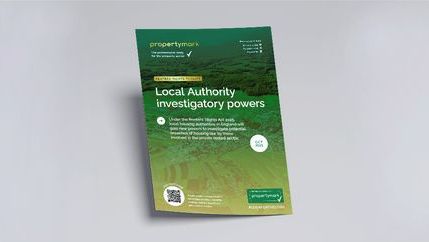
Propertymark continues to strongly campaign for amendments to the Bill which strike a balance of fairness for both tenants and landlords. While the legislation aims to protect renters, there is a real risk that overly restrictive regulations will push landlords to sell their properties, reducing the supply of rental homes, driving up rent prices and making it even more difficult for people to find affordable housing.
For the Bill to be workable and effective, it needs to create protections for renters without discouraging landlords from staying in the market, ensuring both groups can utilise property to rent.
Key amendments now included in the Bill
Limiting rent in advance
By preventing tenants from paying rent upfront the UK Government will potentially, reduce the housing options available to financially vulnerable people.
People on fixed incomes like pensions, those with lower incomes, the self-employed, and overseas students may all have challenges passing referencing and affordability checks. Paying a larger proportion of rent at the start of a tenancy gives tenants an alternative way to evidence their ability to sustain a tenancy, giving landlords confidence in renting.
Housing Minister Matthew Pennycook, MP, stated that landlords will still have the ability to request one month's rent in advance, alongside a security deposit of up to 5 or 6 weeks rent. He went on to say that the use of referencing and affordability checks, and the ability to request guarantors, should be enough to give landlords confidence.
Eviction grounds for student tenancies
The Bill currently only makes eviction Ground 4A available for student HMOs if the tenancy is signed less than six months before its start date. However, it is common practice for student agreements to be signed up to a year in advance, driven by students who want to ensure they have secured accommodation in line with the predictable pattern of the academic year.
If Ground 4A cannot be used, it could interfere with landlords regaining possession of their property ahead of each academic year, impacting future tenancies.
Furthermore, this Ground does not apply to one- and two-bedroom (non-HMO) properties rented to students, leading to serious concern that property owners will not have enough security to continue offering their properties to students, reducing the availability of decent accommodation for young people in university towns.
Landlord fees to fund Ombudsman
Fees paid by landlords will directly fund the creation and work of the private rented sector Ombudsman, providing renters and landlords with access to an effective and fair dispute resolution service.
Guarantors cannot be liable after a tenant dies
This amendment prevents an individual guarantor from being asked to pay rent for a property after the person (or people) they are standing guarantor for dies. Housing Secretary Angela Rayner commented that this will safeguard bereaved guarantors, often family members, against financial hardship during a time of grief.
Private rental sector database
The UK Government has now set out the information that will be required about the landlord and the properties they rent out. This includes the name, address and contact details of the landlord and managing agent, details of any enforcement action taken against the landlord or agent, and details of any previous eviction notices that have been served to a tenant. Registration will be compulsory and costs will be covered by fees landlords pay.
Home adaptations for disabled tenants
Although this amendment was withdrawn before the vote, Pennycook gave assurances that it would be discussed further at the next stage. The proposal would allow disabled tenants to have a right to appeal if landlords do not agree to adaptations recommended by a local authority Home Assessment, as long as the recommendations are ‘reasonable adjustments’ under the Equalities Act 2010.
Examples of reasonable adjustments include installing ramps or grab rails, changing taps and light switches, widening doorways, or installing motion-activated lighting near doorways and paths.
Working for our members
Propertymark is actively campaigning on the Renters’ Rights Bill, building on our work with its predecessor, the Renters’ (Reform) Bill. Our focus is to advocate for fair, balanced, and effective reforms to the private rented sector, ensuring the voices of property agents are heard throughout the legislative process.
We’ve highlighted the vital role letting agents have in shaping these reforms, emphasising their expertise to help achieve positive outcomes for tenants and landlords. Our regional executives have been instrumental in communicating member concerns directly to the UK Government, ensuring these perspectives are considered during the development of the legislation.
Propertymark has consistently raised awareness about the potential impacts of the legislation, offering constructive suggestions to create balanced reforms. To influence policy development, we’ve provided expert testimony to parliamentary reports, responded to public consultations, and produced research reports and briefings that have been shared with Ministers and UK Government officials.
We also keep our members informed and prepared for major changes in the rental market. This includes a regularly updated Toolkit, detailed guides, and practical advice to help agents understand and adapt to the Renters’ Rights Bill.
Renters' Rights Act
The Renters’ Rights Act 2025 received Royal Assent on 27 October 2025. The first phase of reforms will take effect on 1 May 2026, marking the most significant shift to tenancy law in a generation. From this date, all existing and new private tenancies in England will move onto the new system.




